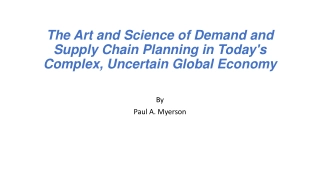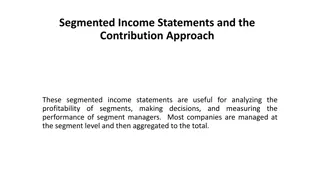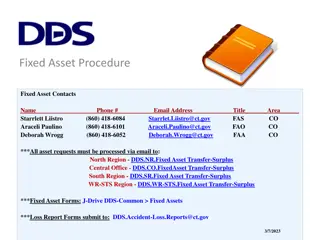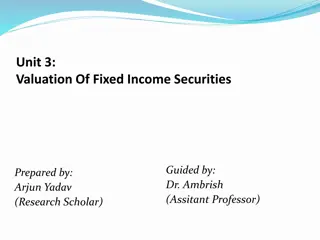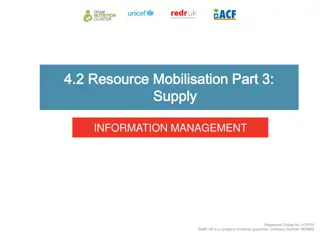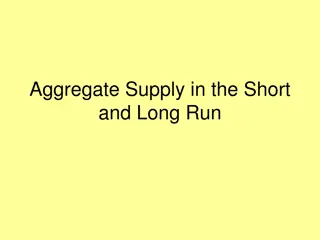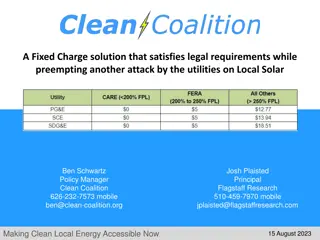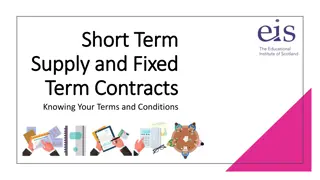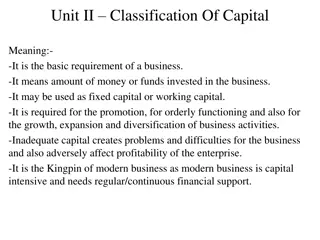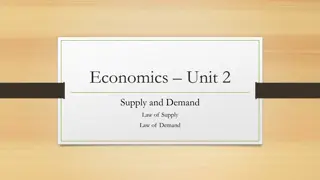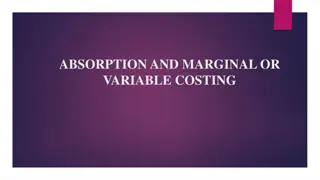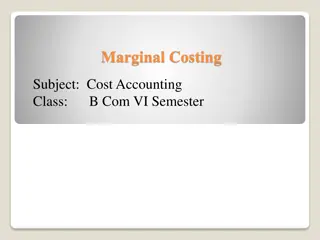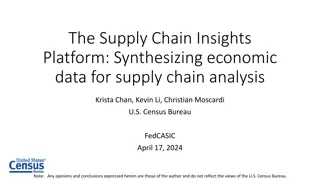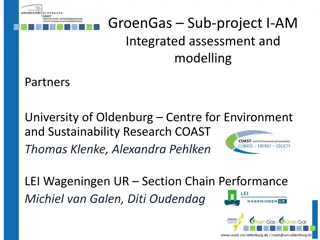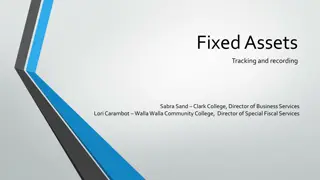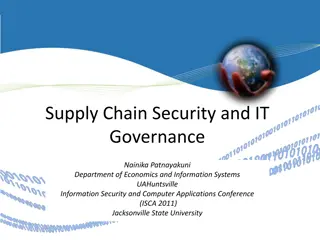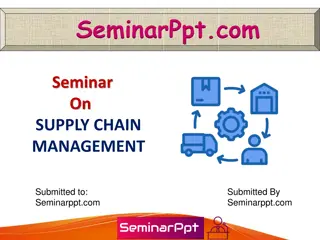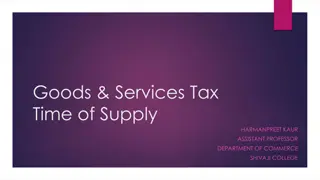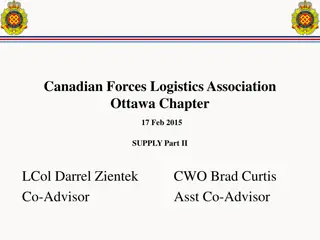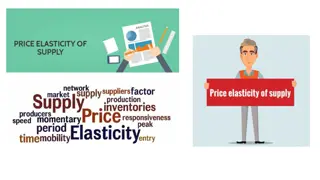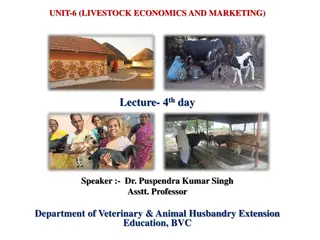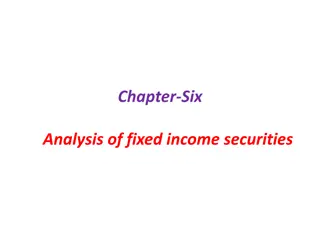The Art and Science of Demand and Supply Chain Planning: Navigating Today's Global Economy
Explore the intricacies of demand and supply chain planning in the modern global economy through the insightful content provided in this book. From achieving supply and demand balance to adapting to uncertainties like navigating white water rapids, the text delves into strategies for improving accur
2 views • 201 slides
INVENTORY MANAGEMENT.
Managing inventory under ISO 15189 guidelines involves Quantity, Quality, and Process management. Key aspects include demand forecasting, inventory movement control, consumption planning, and ensuring fitness for purpose. Quantity management aims to balance demand and supply, manage supply economics
5 views • 13 slides
Direct Lender - Traditional Loan Solution - Short Term Loans UK
Short Term Loans Direct Lenders | Short Term Loans UK Direct Lender | Short Term Loans UK\nShort term loan are provided to borrowers on a short-term basis by lenders who are available around-the-clock. One handy aspect is that because the short term loans UK is unsecured, you don't have to pledge yo
0 views • 1 slides
Understanding Segmented Income Statements and the Contribution Approach
Segmented income statements help analyze segment profitability, make decisions, and measure segment manager performance. This approach involves traceable fixed costs, common fixed costs, and segment margins. Segment margin represents profitability after covering all costs associated with the segment
2 views • 16 slides
Fixed Asset Management Procedures and Contacts Overview
Comprehensive overview of fixed asset management procedures, contact information, asset categories, receiving new assets guidelines, inventory audits, responsibilities, and related forms. Includes details on controllable and capital equipment, asset definitions, categories, and the roles involved in
1 views • 15 slides
Understanding Valuation of Fixed Income Securities
Explore the valuation process for fixed income securities like bonds with a focus on characteristics, capitalization of cash flows, and bond yields. Learn about the features of fixed income securities and how to calculate their present value based on cash flows and discount rates.
0 views • 9 slides
Responsibilities and Collaboration in Supply Management for Emergency Response
The role of various stakeholders in supply management for emergency response is crucial. The Nutrition Cluster Coordinator (NCC) coordinates with partners to identify and address supply needs, while Information Management Officer (IMO) supports in calculating caseloads and consolidating supply reque
1 views • 24 slides
Understanding Aggregate Supply in the Short and Long Run
Aggregate Supply in the short and long run is crucial in understanding the relationship between the economy's price level and the total quantity of goods and services produced. In the short run, sticky wages and production costs play key roles in determining supply levels, while in the long run, cha
0 views • 16 slides
Clean Coalition's Fixed Charge Proposal for Local Solar Energy
Clean Coalition, a nonprofit organization, aims to accelerate the transition to renewable energy with a proposed Fixed Charge solution that meets legal requirements and defends against attacks by utility companies. The solution, represented by Ben Schwartz and Josh Plaisted, focuses on clean local e
0 views • 16 slides
Understanding Lipids: Waxes, Fats, and Fixed Oils
Lipids are organic compounds like waxes, fats, and fixed oils found in plants and animals. Fixed oils are reserve food materials, while fats are solid at higher temperatures. These substances are esters of glycerol and fatty acids, with various components giving them unique properties and flavors. C
0 views • 20 slides
Fixed Asset Management Procedures and Contacts Overview
This document provides an overview of fixed asset management procedures, contacts, categories, and responsibilities within the State of Connecticut. It covers the definition of fixed assets, capital vs. controllable equipment, receiving new assets, inventory audits, asset management responsibilities
0 views • 15 slides
Understanding Short-Term and Fixed Supply Contracts in Teaching
Exploring the differences between short-term and fixed-term supply contracts for teachers in Scotland, covering national and local negotiations, SNCT codes of practice, and the roles of EIS representatives. Learn about the contractual terms, conditions, and responsibilities involved in these types o
1 views • 16 slides
Introduction to Lipid Biosynthesis and Fixed Oils in Pharmacognosy Lecture
In this lecture by Asst. Prof. Dr. Ibrahim Salih, the focus is on lipid biosynthesis, specifically the three phases involved: glycerol formation, fatty acid biosynthesis, and triglyceride production. The classification of fixed oils into drying, semi-drying, and non-drying categories based on their
0 views • 13 slides
Understanding the Classification and Importance of Capital in Business
Capital is crucial for businesses, whether for promotion, functioning, growth, or expansion. It can be classified as promotional, long-term, short-term, or development capital. Factors influencing capital requirements include business activity, size, product nature, technology, business cycle, and l
2 views • 13 slides
Understanding Supply and Demand in Economics
Explore the fundamental concepts of supply and demand in economics, including the laws that govern them. Learn about the characteristics of free markets, the factors that determine supply, and how prices influence the quantities supplied and demanded. Gain insights into the law of supply and law of
1 views • 21 slides
Understanding Absorption and Marginal Costing in Accounting
Absorption costing, also known as full costing, encompasses all costs including fixed and variable related to production. It aids in determining income by considering direct costs and fixed factory overheads. Meanwhile, marginal costing focuses on only variable manufacturing costs and treats fixed f
0 views • 14 slides
Conformal Window in SU(3) Gauge Theories: IR Fixed Points and Scaling Hypothesis
Study of temporal propagator behaviors near fixed points, effective masses in free fermion examples, and strategies to find zero of beta functions in SU(3) gauge theories. Investigation of coupling constants and lattice sizes to determine existence of Banks-Zaks fixed point.
0 views • 11 slides
Understanding Marginal Costing in Cost Accounting
Marginal Costing is a cost analysis technique that helps management control costs and make informed decisions. It involves dividing total costs into fixed and variable components, with fixed costs remaining constant and variable costs changing per unit of output. In Marginal Costing, only variable c
1 views • 7 slides
Introduction to Supply Chain Management
Explore the key components of supply chains, the importance of supply chain management technology, and strategies to overcome challenges. Learn about supply chain visibility, the structure of supply chains, and the three segments - upstream, internal, and downstream. Discover how organizations acces
1 views • 29 slides
Enhancing Supply Chain Insights Through Holistic Data Synthesis
Synthesizing economic data for comprehensive supply chain analysis, this talk by Krista Chan, Kevin Li, and Christian Moscardi from the U.S. Census Bureau discusses the goals, challenges, supply chain interests, data sources, and desired functionalities to present a holistic view of product supply c
0 views • 16 slides
Integrated Assessment and Modelling for Sustainable Biogas Supply Chains
The GroenGas sub-project I-AM focuses on integrating and synthesizing results from various sub-projects to assess innovations and improvements in biogas supply chains. The project aims to implement powerful options for sustainable supply chain management, including performance analysis, benchmarking
0 views • 14 slides
Comprehensive Fixed Assets Management Guidelines for Educational Institutions
Explore a detailed guide on tracking and recording fixed assets in educational institutions, covering key aspects such as capital assets accounting procedures, general ledger accounts, and the definition of capital assets. Learn the minimum standards for valuing assets, recording guidelines, and the
0 views • 25 slides
Understanding Supply in Economics
Explore the definition of supply, changes in supply versus changes in quantity supplied, non-price determinants of supply, the supply curve, key outcomes to know, and real-world examples affecting gasoline supply. Develop a strong foundation in economic concepts with detailed explanations and graphi
0 views • 33 slides
Understanding Supply in Economics
Explore the concept of supply in economics, including its definition, determinants, and graphical representation. Learn about the law of supply, non-price factors affecting supply, and key terms such as market supply and horizontal summation. Understand the difference between a change in quantity su
0 views • 30 slides
Understanding Supply in Economics
Supply in economics refers to the quantity of goods that firms are willing to produce at different prices over a specific period. The Law of Supply states that as prices increase, the quantity supplied by firms also increases. Individual and market supply curves illustrate this relationship, with ot
0 views • 28 slides
Understanding Supply and Costs of Production in Economics
Supply in economics refers to the availability of goods and services in the market, influenced by factors like the law of supply, supply schedules, and supply elasticity. Cost of production involves considering marginal benefits and costs in determining output levels. These concepts are vital in und
0 views • 20 slides
Enhancing Supply Chain Security and IT Governance: An Overview
This presentation delves into the critical aspects of supply chain security and IT governance, highlighting the synchronization of IT decisions across supply chains, global supply chain concerns, the cost implications of supply chain security lapses, and the need for more research and strategic alig
0 views • 28 slides
Understanding Supply Chain Management: Key Concepts and Processes
Supply chain management (SCM) involves the centralized management of goods and services flow, covering processes from raw materials to final products. By efficiently managing the supply chain, companies can reduce costs and improve product delivery. This seminar presentation explores the definition,
0 views • 24 slides
Understanding Goods and Services Tax (GST) Time of Supply
Goods and Services Tax (GST) time of supply, also known as TOS, determines when GST becomes payable on a supply. This includes various elements like agreement to supply, delivery of goods, provision of services, invoice issuance, payment, and recording of payments. The time of supply for goods and s
0 views • 26 slides
Canadian Forces Logistics Association Ottawa Chapter Update
The Canadian Forces Logistics Association Ottawa Chapter provided updates on supply chain management, officer courses, qualification updates, and riggers' career path. They discussed initiatives such as Supply Update Roadmap, Supply Relationships Geographic Map, Supply Officer and Supply Tech update
0 views • 11 slides
Approaches to Planning in Leisure, Sport, and Tourism: A Detailed Analysis
This content discusses various approaches to planning for leisure, sport, and tourism, emphasizing stakeholder requirements, fixed standards, unmet needs, benefits provision, and increasing participation. It explores the types of approaches such as adopting fixed standards, providing opportunities,
0 views • 28 slides
Understanding Fixed Action Patterns in Animal Behavior
Fixed action patterns are innate, stereotyped behaviors triggered by specific stimuli in animals. These behaviors are evolutionarily advantageous, occurring independently of individual experience. Examples include male sticklebacks displaying aggression during breeding and geese instinctively tendin
2 views • 9 slides
Understanding Fixed Income Securities: Bonds Overview
Learn about fixed income securities in week 2 of the Fundamentals of Investment course, focusing on bond characteristics, types, and risks. Bonds are vital debt instruments issued by organizations to raise funds, with features like fixed maturity dates and interest rates. Explore various bond types
0 views • 20 slides
Reliance Nippon Life Fixed Savings Plan - Key Benefits and Coverage Details
The Reliance Nippon Life Fixed Savings Plan is a non-linked, non-participating individual savings life insurance plan offering survival benefits, maturity benefits, and death benefits. Policyholders can benefit from fixed regular additions, guaranteed sum assured on maturity, and protection for thei
0 views • 14 slides
China-Africa Supply Chain Cooperation: Challenges and Opportunities
China-Africa Supply Chain Cooperation presents both challenges and opportunities for development. The growth of China-Africa supply chain is crucial, considering Africa's participation in the global supply chain mainly focused on providing primary products. The strategic importance of this relations
0 views • 19 slides
Understanding Price Elasticity of Supply in Economics
Price elasticity of supply measures how much the quantity supplied responds to changes in price. It can be inelastic (quantity supplied responds slightly), elastic (quantity supplied responds substantially), or unit-elastic (price elasticity of supply equals 1). Various determinants like the passage
0 views • 16 slides
Understanding Livestock Economics: The Law of Supply Explained
Exploring the concept of supply in livestock economics, this lecture covers theories, individual supply schedules, market supply schedules, and the law of supply. Dr. Puspendra Kumar Singh delves into the relationship between commodity prices and producer supply, offering insights into market dynami
0 views • 30 slides
Understanding Fixed-Income Securities for Investment
Fixed-income securities offer fixed returns up to a redemption date or indefinitely, comprising long-term debt securities and preferred stocks. These investments involve various risk factors, including default risk. Long-term debt securities, such as bonds, provide a safe asset but require careful c
0 views • 47 slides
Understanding Demand and Supply in Economics
Demand and supply are core concepts in economics, driving the market economy. Demand reflects the desire for a product at different prices, with an inverse relationship between price and quantity demanded. Supply, on the other hand, represents what producers are willing to offer at various prices, w
0 views • 7 slides
Competition Among Asymmetric Sellers with Fixed Supply - Research Overview
This research focuses on competition among sellers with fixed supply in markets for ads, where publishers determine slot allocations to advertisers based on given budgets. The study explores how publishers can maximize revenue by choosing allocation policies strategically, considering symmetric adve
0 views • 21 slides
